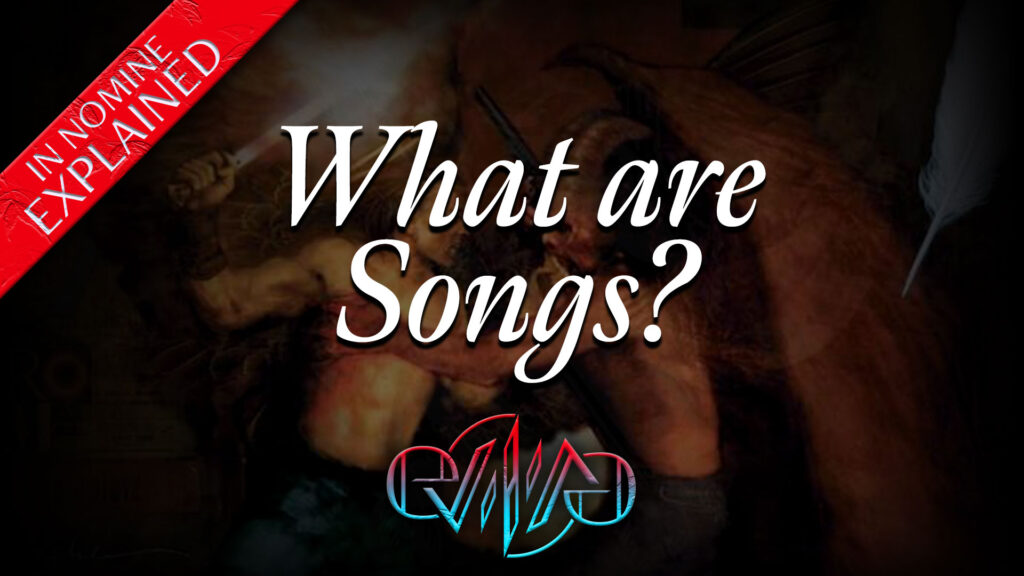Let’s learn all about Songs in the tabletop role-playing game In Nomine. In Nomine is a role-playing game designed by Derek Pearcy and published in 1997 by @Steve Jackson Games. You can learn more on the official website here: http://www.sjgames.com/innomine/ or the Wikipedia page here: https://en.wikipedia.org/wiki/In_Nomine_(role-playing_game). You can buy In Nomine products here: https://www.drivethrurpg.com/browse/pub/12199/Steve-Jackson-Games/subcategory/28908_30775/In-Nomine?affiliate_id=50797
Time Stamps:
About In Nomine
Written by Derek Pearcy + Illustrated by Dan Smith
Edited by Jeff Koke, Steve Jackson, and Susan Pinsonneault
Cover art by John Zeleznik (first printing) and Christopher Shy (second printing)
In Nomine is a modern roleplaying game in which the players take the part of celestial beings – angels and demons – as they struggle for control of humanity and themselves. The celestials, powerful though they may be, are merely pawns in a much larger game being played by their Superiors, the Archangels and Demon Princes. Based on the best-selling French RPG by the wonderfully diabolical Croc!
In Nomine won the Origins Award for Best Graphic Presentation of a Roleplaying Game, Adventure, or Supplement of 1997.
Transcript
Cold Open
Songs are a part of the Symphony, and can be learned.
Intro
Welcome to Eviliv3, the live media commentary show that answers the question, are songs magic spells? Subscribe if you’re new to the channel, because today we are continuing our In Nomine series with this episode, What are Songs?
Discussion
What are Songs?
Songs are referred to as complicated themes that can change the symphony, and miracles on call, fueled by Essence. Both descriptions are correct technically, but they do a massive injustice to the nature of songs. The Symphony may itself be seen as a song sung by God, and the songs his celestials sing are imperfect echoes of the Symphony itself. The first angel to sing a song is Eli, who subsequently taught the skill to his fellow angels. Whether he discovered how to sing on his own or whether God taught him is less important. What is important is that songs allow angels to alter the fabric of reality, by using the Symphony’s own chords to change it.
As talented as Eli is, his long time servitor Israfel, the Angel of music, is possibly even more talented. She is one of the most powerful Word-bound celestials in existence and knows nearly every song that has ever been sung. She often discovers new Soldiers of God for the Archangels, so she is one of the few angels who has a good relationship with everyone. It is important to note that Songs are not magic. Magicians, which are distinct from Sorcerers, may learn songs like a Soldier of God may, but it still is not magic. Magic as mortals understand it does not exist. Sorcery however very much does, but it is something else entirely.
Using Songs
Songs are Resources that you may choose upon character creation. They cost one point per level of song. Each song has three distinct categories for each Realm: Celestial, Ethereal and Corporeal. Each variant of the song is different with separate effects. If you know more than one variant of a song, it becomes more powerful when performed. This manifests in game mechanics with a +1 to the Check Digit for each version of the Song you know after the first, to a maximum of +2 when you know all three versions. Every time you perform a song, you must spend at least one Essence, though some songs allow you to spend more for grander successes. Unless the Song specifies otherwise, each extra point of Essence can either go toward improving the target number or enhancing the Song, not both! But you can spend extra essence on each.
Your success with a song is equal to the Check Digit. The higher the check digit the better the success. You may improve the Check Digit with Affiliation. Many songs are Affiliated with one or more Words. If you are a Celestial or Saint who served a Superior with a listed Word, you gain a +1 to your Check Digit. Some Songs grant specific Choirs or Bands the affiliation bonus as well, but they cannot stack.
If you fail to perform a song by rolling the d666 higher than your Target number, you still lose the Essence. Your Target Number is equal to the level of the Song plus the number of Forces of that type. So if you are casting the Corporeal Song of Light, you would use your Corporeal Forces for your Target Number. It is important to note that Songs may not be opposed or Dodged unless specified! This makes them incredibly powerful tools to those who know them. Opposition takes the form of either Resistance or Negation. Resistance requires a Contest between Check Digits of a Song. Negation requires only the target to succeed at their roll.
The performance requirements of a Song depends on the level of the Song that is known. There are three elements of Performance to a song: mental focus, hand motions and vocals. A Song performed at level 1 requires concentration, both hand motions and vocal singing. Anything that prevents you from concentrating, using both hands or using your voice will prevent a song from being performed. At level 2 the Song requires concentration, and both hands or your voice, but not both. At level 3 and 4, you only require hands or vocals and it takes effect immediately, but you can alternatively use your mind only , and the Song would take effect the following round instead! At levels 5 and 6, you may perform the Song mentally only and it takes effect instantly. Celestial Relics which contain Songs follow these same rules if employed.
You may wish to take extra time to perform a Song and the longer you take the better chance you have to succeed. If you take two extra rounds to perform it, you gain a +1 to the Target Number, one extra minute grants +2, five minutes grants +3 and a full hour grants a +4 to the Target Number. You may spend even more time for further bonuses as well. The duration of the song is generally defined by the Check Digit. However you may cancel a song at any time with a successful Will roll. Any effects suffered up until then remain. Canceling a song is an action that can be repeated if failed.
Because it requires the expenditure of Essence to perform a Song, it will disturb the Symphony, even if you don’t succeed in the performance! Each Song specifies the severity of the disturbance.
Acquiring Songs
There are four categories of Songs in In Nomine. Common songs, or Songs which are common knowledge to all Celestials which may be granted by a Superior. Secret Songs, which most Superiors have a small selection of. They typically reserve these for their favored Servitors. Restricted Songs, songs that not everyone is capable of performing due to their very nature. And finally Lost Songs, powerful Songs that manipulate the very fabric of the Symphony! Some of these have not been used since the dawn of creation.
You may acquire a new Song in one of three ways: Imprinting, learning or imitating. Imprinting a Song is done by either a Superior, an Archangel or Demon Prince, or by a Songmaster. This doesn’t necessarily mean you are able to perform it however. Most all imprinted Songs are at level 1. Learning a new Song is frowned upon by Superiors, as they like to reserve the right to determine what their Servitors are capable of.
It takes time to learn a song through instruction. It begins at 8 weeks which may be adjusted by subtracting a week for each Force the student has in the category of song being taught. This daily instruction will disturb the Symphony during each day’s instruction. You may also learn a Song from a Relic in this way. At the end of your instruction, roll d666 with your target number equal to the teacher’s level in the Song plus the student’s number of forces in the category of Song. If you already know the other two categories, you gain a +2. If you are using a Relic rather than a teacher, subtract 2 if you know the other categories of the song and a -4 if it’s a new song to you. You can not spend Essence to learn a new song.
You can also learn a new song through Imitation. It’s much the same as teaching, only they don’t know it! The student must be able to perceive the performance by succeeding in a Perception roll to detect its disturbance. The final d666 roll is made with a -1 penalty.
There are alternate rules for Songs featured in the Liber Canticorum, but those are up to your GM whether they exist in their campaign or not. I hope you understand Songs more and if you have any questions, feel free to place them in the comment section below.
Outro
Thank you for watching today’s In Nomine episode. Subscribe and ring the bell if you are new to the channel. Don’t forget to click the like button and comment to let others learn about this award winning role-playing game and this channel.
And as always, remember that evil spelled backwards is live, so get out there and Be Evil!

